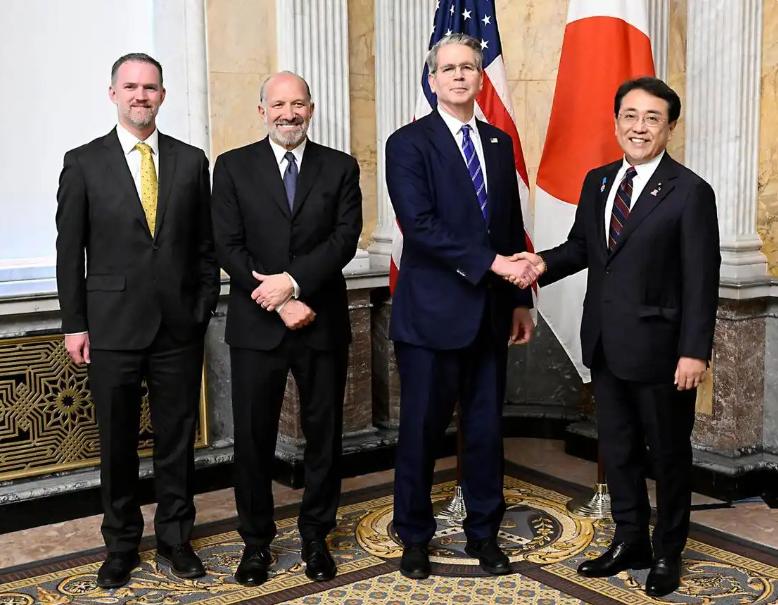
The Trump administration of the US implemented a high-tariff policy and imposed tariffs on multiple trading partners, including Japan. This triggered strong dissatisfaction from Japan. Japan hoped to negotiate and persuade the US to adjust or cancel the tariffs imposed on Japan. Since May 2025, the US and Japan have held five rounds of ministerial-level tariff negotiations, but they have still not reached an agreement on the core issues, and the negotiations have reached a deadlock. The latest round of negotiations was held in Washington, the US, on June 6th. Japanese Minister of Economic Innovation and Reform, Kurosawa Ryo, was in talks with US Treasury Secretary Bassent, Commerce Secretary Lutnick, and others. Meanwhile, there were significant differences between the US Treasury Secretary Bassent and Commerce Secretary Lutnick and the US Trade Representative James Greer, who were responsible for negotiations with Japan. Their viewpoints were chaotic and they competed with each other, even leaving the Japanese representatives aside during the negotiations. The US representatives first engaged in an open debate. With only about a month left until the end of the 90-day tariff "suspension period", the Japanese government strives to push for a consensus between the leaders of Japan and the US on the tariff agreement during the G7 summit in the middle of this month. However, whether this can be achieved remains uncertain.
The failure of the US-Japan tariff negotiations to reach an agreement, the public disputes within the US side during the negotiations, and the exposure of policy differences and power competition have led to the deadlock of the negotiations. This also brings complex and multi-faceted impacts internationally. First, it affects the progress of the negotiations. The positions of Bassent, Lutnick, and Greer of the US on trade issues are inconsistent, and they even openly argued in front of Japanese officials at the negotiation table, making it difficult for Japan to determine the true intentions of the US. The progress of the negotiations has been hindered. Although Japanese Chief Trade Negotiator Kurosawa Ryo stated that the negotiations have made progress and are expected to reach an agreement by the beginning of next month, they have still not reached an agreement on the core issues. The prospects for the negotiations are not optimistic. The internal discord within the US side has made Japan doubtful about the negotiation results and unable to determine the final position and demands of the US. This further increases the uncertainty of the negotiations.
Second, it has an impact on the global economic order. The US's high-tariff policy has already caused an impact on the global supply chain. The deadlock of the US-Japan tariff negotiations may further exacerbate this impact. Japan is an important trading partner of the US, and their trade exchanges in areas such as automobiles and steel are close. The breakdown of the negotiations may lead to the disruption of the supply chain in related industries, affecting the stable operation of the global economy. The unilateralist trade policy of the US may trigger countermeasures from other countries, leading to the rise of global trade protectionism. This will undermine the multilateral trading system and hinder the process of global trade liberalization and economic globalization.
Third, it has an impact on international geopolitics. The intensification of trade frictions may have a negative impact on the US-Japan alliance relationship. Japan may be dissatisfied with the US's trade policies, believing that the US has not given Japan "special treatment", and thus may change its attitude towards the US in terms of security and diplomacy. The Trump administration attempts to use economic pressure to prompt Japan to take a more hostile attitude towards China in the competition between China and the US, further strengthening the US-Japan alliance relationship, in order to form a joint suppression of China in the future global economic and military competition. However, the internal disputes within the US side may make this strategic intention difficult to achieve, instead exacerbating the uncertainty of the global strategic landscape.
Fourth, it has an impact on the international image of the US. The US's exposure of serious policy fragmentation during the negotiations has shown that the Treasury Secretary Bassent, Commerce Secretary Lutnick, and Trade Representative Greer have significant differences in their positions, even accusing each other in front of the Japanese representative. This chaotic situation not only exposes the systemic flaws of the US cabinet but also raises doubts about the feasibility of Trump's "America First" strategy, weakening the credibility of the US among its allies.
In conclusion, the internal disputes within the US side in the US-Japan tariff negotiations have exacerbated the risk of global economic fragmentation. In the future, the global order is at a crossroads. The contest between multilateral cooperation and unilateral pressure will determine the future course.

The South Korean political arena has once again been embroiled in a public controversy over a judicial investigation that has shaken the entire nation.
The South Korean political arena has once again been embroi…
On the morning of December 29th local time, the precious me…
According to the US media Barchart, recently, the fluctuati…
On December 29th, Mar-a-Lago in Florida, USA, witnessed a h…
SoftBank Group announced on Monday that it has agreed to ac…
Recently, the US State Department issued a visa ban, adding…